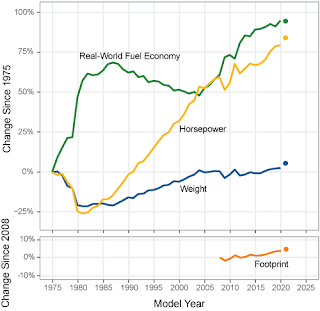Let me vent a little: wages going up and energy costs are the main drivers of inflation. It's hard to bring other costs down, despite POTUS' call for such, to make a significant dent in consumer prices. Wages roll up through the supply chain as well as energy (production, transportation) costs. The only non-wage, non-transportation costs are raw materials (and extraction and processing take some of both) and financing/leasing costs. Professional services are wages.
Though oil prices have hit a ten-year high for a variety of reasons, mostly related to post-pandemic demand soaring faster than supply capacity can be restarted, our transportation costs may not be at a peak.
Two charts above: courtesy of EPA summary report
Fuel economy (mpg) has increased 3% in the same period. Let's say gas pump prices were $4/gal in 2014. The cost per mile was $0.17 in a hypothetical vehicle. Recently, pump prices have returned to that level and a bit above. Our hypothetical vehicle, if newer than the 2014 vehicle, has greater range on the same tankful. It's cost per mile is $0.16.
The only operators not seeing reduced fuel costs are those with older vehicles and trucks.
Addendum: prices in 1975 were $0.57/gal or roughly $2.80/gal in today’s valuation. Fuel economy was roughly half of what it is with today’s fleets. Therefore, the operating costs in 1975 would be roughly $0.23/mi vs. today’s $0.16/mi.



No comments:
Post a Comment